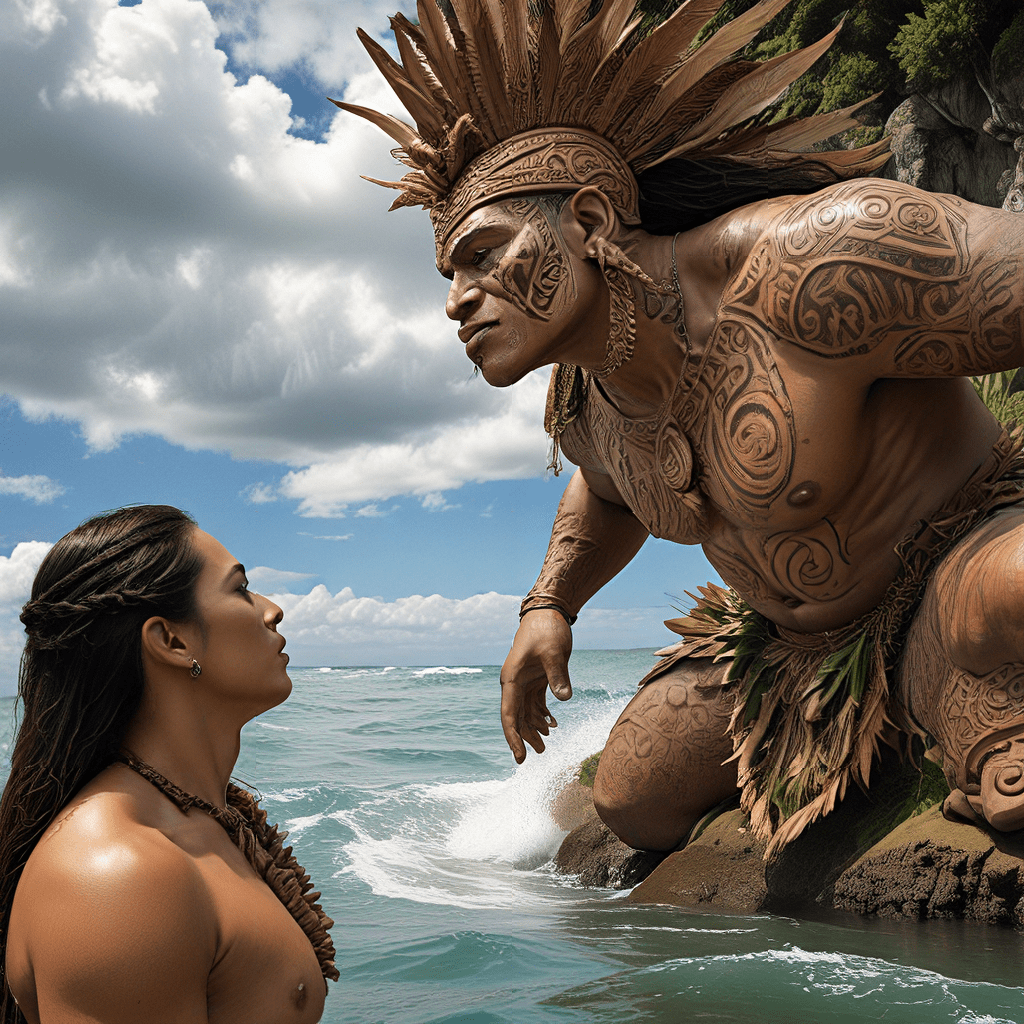Maori Mythology: Embracing Respect for Earth and Ocean
Maori mythology is a rich tapestry woven with stories, legends, and beliefs passed down through generations. These stories, steeped in ancient wisdom, offer profound lessons about the interconnectedness of all things and the critical importance of respecting the environment. From the creation of the world to the guardians of nature, Maori mythology emphasizes a deep reverence for the land and sea, offering insights that are as relevant today as they were centuries ago.
The Creation Myth and the Interconnectedness of All Things
The Maori creation myth, known as "Te Kore" (the void), sets the stage for understanding the profound connection between humanity and nature. The story tells of the emergence of the world from nothingness, a process guided by the gods. The very act of creation demonstrates the inherent interconnectedness of all things, highlighting that everything, from the sky to the earth, the trees, and the oceans, is inextricably linked. This concept of interconnectedness is central to Maori culture and forms the foundation for a deep respect for the environment.
Tane Mahuta and the Birth of the Land
One of the most prominent figures in Maori mythology is Tane Mahuta, the god of forests and birds. Tane is revered for his role in separating the sky from the earth, bringing forth the world as we know it. The story of Tane emphasizes the sacredness of the land and the importance of protecting its natural beauty. His act of separating the sky and the earth is a metaphor for the creation of all life, showcasing the vital role of the land in sustaining life.
Rongomai and the Gift of Food
The god Rongomai, also known as Rongomatane, is the embodiment of food and prosperity. He is credited with teaching people how to cultivate the land and grow food, a vital skill for survival. Rongomai's story serves as a reminder that the land is a source of sustenance and that it must be treated with respect and care. This aspect of Maori mythology highlights the importance of sustainable practices and responsible stewardship of natural resources.
Tangaroa and the Vastness of the Sea
Tangaroa, the god of the sea, is a powerful figure in Maori mythology. He represents the vastness and the mystery of the ocean, its abundant life, and the unpredictable forces that it holds. Tangaroa's dominion over the sea emphasizes the importance of understanding and respecting the ocean's power and its vital role in maintaining the balance of the natural world.
The Guardians of the Natural World: Tīra and Tāne
Tīra and Tāne are powerful guardians of the natural world. Tīra, the god of the mountains, embodies the strength and resilience of the land, while Tāne, as mentioned earlier, represents the beauty and diversity of the forests. These guardians are seen as protectors, ensuring the health and well-being of the environment. Their stories serve as reminders of the responsibility that humans have to care for the natural world.
Respecting the Spirits of the Land and Sea
Beyond the stories of gods and goddesses, Maori mythology emphasizes the existence of spirits that inhabit the natural world. These spirits, known as "atua," are believed to reside in mountains, forests, rivers, and the sea. The atua are not always benevolent; they can be mischievous, protective, or even vengeful. Their presence underscores the importance of respectful behavior towards the environment.
Maori people believe that every place has its own atua, demanding recognition and reverence. Before entering a forest, a person might offer a prayer or a small offering, asking for permission to enter the space and acknowledging the presence of the atua. This practice emphasizes the interconnectedness of humans and the natural world. Disrespecting the spirits of the land is considered a serious offense, often leading to misfortune or ecological consequences.
The Concept of Mana and its Connection to Nature
The concept of "mana" is fundamental to Maori understanding of the natural world. Mana is a powerful spiritual force that resides in objects, places, and living beings. It represents power, authority, and prestige. The land and sea are imbued with mana, reflecting their inherent importance and vitality.
Respecting the mana of the land and sea is essential for maintaining a harmonious relationship with the environment. The idea that everything possesses mana encourages people to treat the environment with care and respect. For example, harvesting resources sustainably, avoiding unnecessary waste, and protecting sacred sites are all ways of honoring the mana of the land.
The Importance of Rituals and Offerings
Maori culture is rich in rituals and ceremonies designed to honor the spirits of the land and sea. These practices are not simply symbolic; they are deeply meaningful ways of expressing gratitude for the gifts of nature and seeking guidance from the atua.
One common ritual is the "karakia," a prayer or chant used to invoke the blessings of the gods and spirits. Karakia are often performed before harvesting food, venturing into the forest, or setting out to sea. Offerings, such as food, flowers, or feathers, are also presented as a gesture of respect and acknowledgment of the power and generosity of the natural world.
The Consequences of Disrespecting the Environment
Maori mythology offers numerous warnings about the consequences of disrespecting the environment. Stories recount tales of people who angered the gods or spirits through actions like deforestation, pollution, or overhunting. These acts often resulted in natural disasters, illness, or misfortune.
These stories serve as reminders that the environment is not an unlimited resource. The consequences of human actions can have profound and lasting impacts. Maori mythology emphasizes that humans have a responsibility to live in balance with nature, respecting its limits and recognizing its value.
The Ongoing Relevance of Maori Mythology for Environmental Stewardship
Today, the lessons of Maori mythology hold as much relevance as ever. As humans face increasing environmental challenges, the ancient wisdom embedded in these stories offers valuable insights into sustainable practices and the importance of respecting the environment.
The interconnectedness of all things, the reverence for the land and sea, and the consequences of disrespect are timeless themes that can guide us towards a more sustainable future. By embracing the values and wisdom of Maori mythology, we can learn to live in harmony with the environment, honoring the vital role it plays in our lives.
FAQ
Q: What is the connection between Maori mythology and environmentalism?
A: Maori mythology is deeply intertwined with environmentalism. The stories and beliefs emphasize the importance of respecting the natural world and understanding the interconnectedness of all things.
Q: What are some specific examples of environmental practices inspired by Maori mythology?
**A: ** Maori traditions encourage sustainable fishing practices, respecting the limits of natural resources, and honoring the spirits of the land and sea. These practices are closely tied to the beliefs and stories found in their mythology.
Q: How can we apply the lessons of Maori mythology to modern environmental challenges?
A: By recognizing the interconnectedness of all things, understanding the consequences of our actions, and embracing respect for the environment, we can learn from Maori mythology to address modern environmental challenges.




